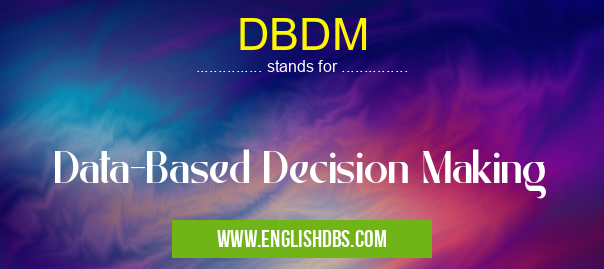What does DBDM mean in GENERAL
Data-Based Decision Making (DBDM) is an approach to decision making that uses data and analysis to help organizations make better decisions. This approach helps organizations identify the problem, analyze data and evidence, evaluate options, assess risk, develop solutions, and make decisions quickly and effectively.

DBDM meaning in General in Business
DBDM mostly used in an acronym General in Category Business that means Data-Based Decision Making
Shorthand: DBDM,
Full Form: Data-Based Decision Making
For more information of "Data-Based Decision Making", see the section below.
Essential Questions and Answers on Data-Based Decision Making in "BUSINESS»GENERALBUS"
What is Data-Based Decision Making?
Data-Based Decision Making (DBDM) is an approach to decision making that uses data and analysis to help organizations make better decisions.
How does DBDM help in decision making?
DBDM helps organizations identify the problem, analyze data and evidence, evaluate options, assess risk, develop solutions, and make decisions quickly and effectively.
What types of data are used in DBDM?
Different types of data can be used when employing the DBDM approach such as financial information, customer feedback, market research, or other qualitative or quantitative data sources.
Is DBDM popular among organizations?
Yes! DBDM has become increasingly popular with many organizations over recent years as it allows them to make more informed decisions with greater accuracy.
How do organizations use data in a decision-making process?
Organizations use data to identify problems more accurately; they collect the necessary information needed for their decision-making process through analyzing their existing processes; they also use analytics to reach a conclusion on potential outcomes before making a final decision.
Final Words:
Data-Based Decision Making is an important tool for modern organizations as it provides accessible ways of understanding complex business problems and finding solutions which supports strategic planning activities. By using this framework you can leverage data in order to receive insights that will result in better decision-making processes.
